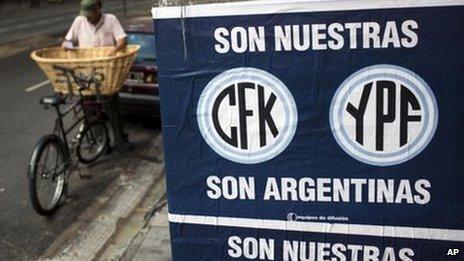YPF nationalisation: Is Argentina playing with fire?
- Published

Amid applause and cheers, Argentina's President Cristina Fernandez de Kirchner put an end to months of speculation when she announced moves to nationalise YPF, the country's biggest oil company.
The decision to wrench control from the majority stakeholder, Spanish oil giant Repsol, has provoked howls of protest from Spain but has been broadly welcomed in Argentina.
President Fernandez's announcement reminded many of December 2001, when in the same presidential palace an interim president declared that Argentina was not going to repay its enormous foreign debt.
But only weeks later, the cheers and smiles turned to tears as the decision accelerated Argentina's plunge into the worst economic crisis of its history.
And for some economic analysts, the decision to put YPF back into state control could bring more woes than real solutions for the country's energy crisis.
President Fernandez justified the move as necessary to reduce the state's energy bill.
In 2010 Argentina started importing fuel for the first time since YPF was privatised in the early 1990s.
Last year the bill ran to $10bn (£6.27bn), and total expenditure for 2012 could be some $14bn.
The Argentine president blames Repsol, saying the company has not invested enough in the development of energy sources to cope with the growing internal demand, but instead has repatriated 90% of its profits.
Repsol insists it has invested in Argentina.
The Spanish government has said the nationalisation of YPF could severely damage the "friendship ties" between both countries, and has warned it will retaliate.
Pressing on
Ms Fernandez is almost certain to have been expecting such fury but nevertheless pressed on against Repsol YPF.
Some analysts point out that Argentina has been keen to get a grip on a strategic area of the economy, as it has been one of the few South American nations without an influential state-owned company in the energy sector.
"The development of a country is closely linked to the availability and production of energy to cope with all its internal demand," says economist Alfredo Zaiat, who writes frequently for a pro-government newspaper.
"To achieve this it was crucial to expropriate Repsol's shares and also to include in the nationalisation draft bill that it is a national interest to become self sustainable in regards to the exploitation of hydrocarbons," he said.
Repsol will be compensated, but the amount will be determined by an Argentine tribunal.
Since Ms Fernandez's husband, the late Nestor Kirchner, was elected president in 2003, public policy has shifted significantly towards favouring a bigger role for the state.
There have also been moves towards reversing the free-market stance which many blamed for the economic crash of 2001-2002.
Ms Fernandez, elected as her husband's successor in 2007, continued his economic model, re-nationalising the flagship airline Aerolineas Argentinas and pushing through a reform to allow the government to use the Central Bank's reserves to pay foreign debt.
The seizure of YPF follows this trend and for some analysts it could mark a precedent for the other foreign-run oil companies in the country.
"As the energy sector has been declared 'in the public interest', this opens up the possibility for the nationalisation of other companies," says oil consultant Eduardo Fernandez.
The move for YPF is likely to have shaken other foreign investors currently in Argentina.
"We see this as negative for Argentina's (already poor) long-term investment prospects and believe that this could spark a partial withdrawal of locally-based foreign operators across other sectors", says Michael Henderson, an economist from Capital Economics.
The Argentine government insists the takeover does not translate into a hostile act towards foreign investors.
"We are fine with [foreign companies making] profits. But these profits cannot come at the expense of our national interests," President Fernandez said.
Before privatisation, YPF was Argentina's flagship oil company. The move to bring it back under state-control will prove popular amongst the government supporters.
But experts believe there are doubts about the government's capacity to fund its oil activities and to reduce fuel imports from abroad.
"To extract more oil the state needs at least $6bn more than what is currently invested and the government does not have such capital," says Daniel Gerol, from G&G Energy Consultants.
In November last year Argentina announced the discovery of vast reserves of shale oil, most of it unexplored.
Analysts believe that foreign investment is crucial to extract this oil.
After Monday's announcement, and the stinging response from Spain, Argentina's biggest foreign investor, the continued arrival of overseas capital seems much less certain.
- Published17 April 2012
- Published7 December 2022
- Published11 July 2011
- Published10 February 2012
- Published29 May 2012